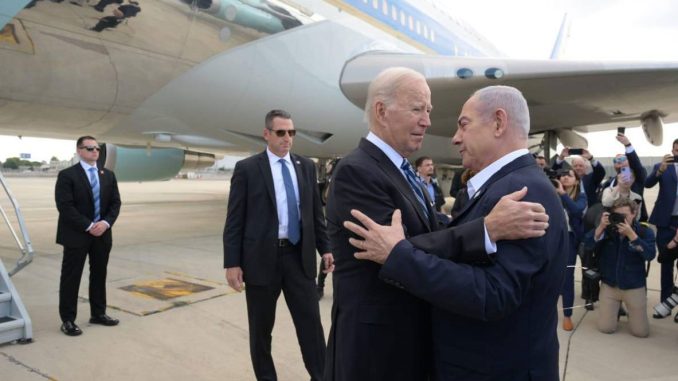
The unprecedented and unprovoked Oct. 7 terrorist attack on Israel, coordinated by Iran through its proxy Hamas, has reaffirmed the necessity of the U.S. and Israel remaining as united as possible.
Even as the military response to Hamas is taking shape, America’s enduring, resilient economic bond with Israel matters more than ever as an integral pillar of the two nations’ alliance.
The U.S.-Israel trade and investment relationship is strong, anchored by annual bilateral trade of about $50 billion in goods and services. Several treaties and agreements, including the 1985 U.S.-Israel Free Trade Agreement that was implemented by then-President Ronald Reagan and then-Prime Minister Shimon Peres, have institutionalized the bilateral economic relationship.
Since the free trade agreement’s signing in 1985, the United States has become Israel’s largest trading partner.
The vibrant economic relationship is, in fact, so significant to both countries that its continuing development cannot be left to chance or to the mercy of an abruptly shifting geopolitical landscape. It must be defended, guided, and further cultivated by renewed commitments encompassing shared security and economic interests.
Its reassuring that in reaction to the recent Hamas terrorists’ horrific assault on Israel and its sadistic brutality, more than 220 predominantly American venture capital firms have expressed unambiguous support for Israel.
The joint statement highlights:
We stand united in our support for the nation of Israel, and we condemn the senseless and barbaric acts of terrorism … . Israel has been an enduring partner to the global innovation ecosystem, fostering groundbreaking technological advancements and startup innovation. … Israel has shown up time and time again for the world in times of need; it is now our time to step up to the plate and to support Israel and the Jewish people.
Indeed, Israel is renowned as a “startup” and scaling-up nation, punching above its weight for a country with a population of only about 8 million. Remarkably, it has become a high-tech powerhouse driven by entrepreneurship and innovation over the past several decades.
Equally notable is that, despite the constant threat of war with hostile neighbors, terrorist activity, and diplomatic hurdles, Israel has advanced economic freedom.
Ron Dermer, Israel’s former ambassador to the United States, who currently serves as the country’s minister of strategic affairs, pointed out that one of the main recipes for Israel’s economic success today was moving away from the socialist system on which the nation was founded, and embracing capitalism.
According to The Heritage Foundation’s 2023 Index of Economic Freedom, a global policy guidebook that tracks free-market policies, Israel is one of the world’s 35 freest economies, ranked second out of 14 countries in the Middle East/North Africa region. (The United Arab Emirates has the freest economy.)
With its overall economic freedom score above the world and regional averages, Israel’s economic competitiveness is anchored in strong protection of property rights and relatively low levels of corruption, both of which have been cornerstones of long-term economic dynamism.
More specifically, Israel’s openness to global commerce has been an important factor in promoting innovation and productivity growth within the country and beyond.
The small but capable Israeli economy has charted a positive trajectory of freedom over the past seven decades—and benefited from it.
Vibrant entrepreneurial growth has been not only vital to Israel’s resilience, but also an important element in its overall security, which has been reinforced by the long-standing trade and investment bonds between the United States and Israel.
This year marks 75th anniversary of the alliance between the U.S. and Israel. Over the past several decades, the U.S.-Israel economic relationship has been a decidedly upward journey together. America’s partnership with Israel is deeply rooted in people-to-people ties and leading-edge business cooperation led by global companies in both countries.
The proven partnership between the two willing allies has reinforced mutually beneficial trade and investment ties as well as strategic interests of the two nations, based on shared values of democratic governance and freedom.
Throughout trying and difficult times over the past 75 years, Israel has demonstrated its willingness and capacity to work with the U.S. toward shared goals of lasting peace and prosperity.
Washington and Jerusalem should build on that steadfastness and advance the proven alliance at today’s pivotal juncture. That’s the only practical way forward.
Have an opinion about this article? To sound off, please email letters@DailySignal.com and we’ll consider publishing your edited remarks in our regular “We Hear You” feature. Remember to include the url or headline of the article plus your name and town and/or state.

Be the first to comment